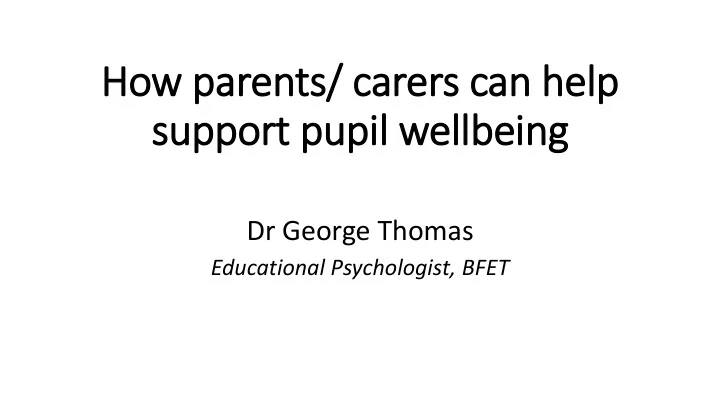

How parents/ carers can help support pupil wellbeing Dr George Thomas Educational Psychologist, BFET
Objectiv ives • To discuss Maslow's hierarchy of needs and how this links to pupil wellbeing. • To discuss ways in which parents/ carers can help support pupil wellbeing.
Maslo low's 's hierarchy of needs
Physiological needs – Die iet • Healthy breakfast that is high in complex carbohydrate/ protein and low in sugar. • Five pieces of fruit and veg per day. • Iron-rich foods (e.g., dark green veg; nuts and seeds; pulses and beans). • Six to eight glasses of water per day. • Caffeine (i.e., stop caffeine intake 6-hours before bed time).
Physiological needs – Sle leep • Children aged between 11 and 18 need 9- to 9.5-hours' sleep per night. • Typical for children in this age group to develop a 'teenage sleep pattern' of less sleep than needed on a school night with more sleep than needed on a weekend night (i.e., to pay back the 'sleep debt' that has built up). • Stop blue light technologies (e.g., mobiles; tablets; laptops; TV; games consoles) 2-hours before bed time and keep them away from the bedroom. • Do mentally stimulating activities (e.g., homework) away from the bedroom.
Physiological needs – Sunlight • When sunlight reaches our skin, our bodies produce Vitamin D. • Whilst you can get Vitamin D in your diet (e.g., fatty fish; cheese; eggs), we get 90-95% from sunlight. • Sunlight increases the body's production of serotonin – the neurotransmitter in our brain that is responsible for happiness and motivation. • It is recommended that we spend 15-minutes a day outside in the sunlight (e.g., a quick walk). • Open bedroom curtains.
Psychological needs – Parenting style le LOW BOUNDARIES/ HIGH BOUNDARIES/ STRUCTURE STRUCTURE HIGH WARMTH/ PERMISSIVE AUTHORITATIVE NURTURE (lenient; indulgent; over- (supportive; assertive; involved) flexible) LOW WARMTH/ UNINVOLVED AUTHORITARIAN NURTURE (distant; uninterested; (rigid; "because I said so"; passive) "I'm the boss")
A note on mental l healt lth • The Children's Society (2008) found that 20% of adolescents may experience mental health difficulties within any given year, yet 70% of those with mental health difficulties do not receive support/ intervention at a sufficiently early stage.
Well llbeing provision at AGGS • See model.
Recommend
More recommend